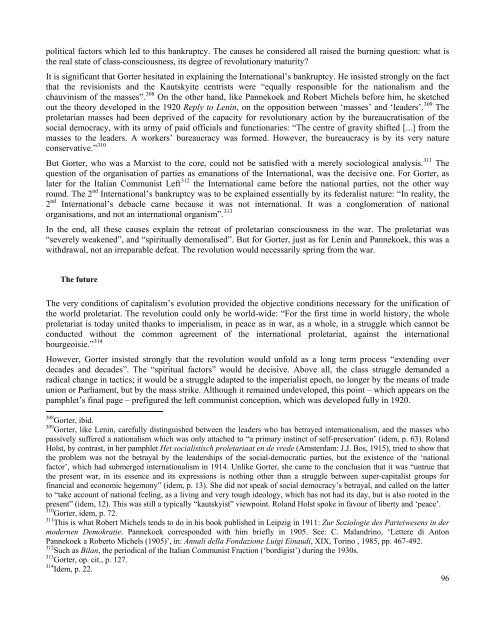The German-Dutch Communist Left - Libcom
The German-Dutch Communist Left - Libcom
The German-Dutch Communist Left - Libcom
You also want an ePaper? Increase the reach of your titles
YUMPU automatically turns print PDFs into web optimized ePapers that Google loves.
political factors which led to this bankruptcy. <strong>The</strong> causes he considered all raised the burning question: what is<br />
the real state of class-consciousness, its degree of revolutionary maturity?<br />
It is significant that Gorter hesitated in explaining the International’s bankruptcy. He insisted strongly on the fact<br />
that the revisionists and the Kautskyite centrists were “equally responsible for the nationalism and the<br />
chauvinism of the masses”. 308 On the other hand, like Pannekoek and Robert Michels before him, he sketched<br />
out the theory developed in the 1920 Reply to Lenin, on the opposition between ‘masses’ and ‘leaders’. 309 <strong>The</strong><br />
proletarian masses had been deprived of the capacity for revolutionary action by the bureaucratisation of the<br />
social democracy, with its army of paid officials and functionaries: “<strong>The</strong> centre of gravity shifted [...] from the<br />
masses to the leaders. A workers’ bureaucracy was formed. However, the bureaucracy is by its very nature<br />
conservative.” 310<br />
But Gorter, who was a Marxist to the core, could not be satisfied with a merely sociological analysis. 311 <strong>The</strong><br />
question of the organisation of parties as emanations of the International, was the decisive one. For Gorter, as<br />
later for the Italian <strong>Communist</strong> <strong>Left</strong> 312 the International came before the national parties, not the other way<br />
round. <strong>The</strong> 2 nd International’s bankruptcy was to be explained essentially by its federalist nature: “In reality, the<br />
2 nd International’s debacle came because it was not international. It was a conglomeration of national<br />
organisations, and not an international organism”. 313<br />
In the end, all these causes explain the retreat of proletarian consciousness in the war. <strong>The</strong> proletariat was<br />
“severely weakened”, and “spiritually demoralised”. But for Gorter, just as for Lenin and Pannekoek, this was a<br />
withdrawal, not an irreparable defeat. <strong>The</strong> revolution would necessarily spring from the war.<br />
<strong>The</strong> future<br />
<strong>The</strong> very conditions of capitalism’s evolution provided the objective conditions necessary for the unification of<br />
the world proletariat. <strong>The</strong> revolution could only be world-wide: “For the first time in world history, the whole<br />
proletariat is today united thanks to imperialism, in peace as in war, as a whole, in a struggle which cannot be<br />
conducted without the common agreement of the international proletariat, against the international<br />
bourgeoisie.” 314<br />
However, Gorter insisted strongly that the revolution would unfold as a long term process “extending over<br />
decades and decades”. <strong>The</strong> “spiritual factors” would he decisive. Above all, the class struggle demanded a<br />
radical change in tactics; it would be a struggle adapted to the imperialist epoch, no longer by the means of trade<br />
union or Parliament, but by the mass strike. Although it remained undeveloped, this point – which appears on the<br />
pamphlet’s final page – prefigured the left communist conception, which was developed fully in 1920.<br />
308 Gorter, ibid.<br />
309 Gorter, like Lenin, carefully distinguished between the leaders who has betrayed internationalism, and the masses who<br />
passively suffered a nationalism which was only attached to “a primary instinct of self-preservation’ (idem, p. 63). Roland<br />
Holst, by contrast, in her pamphlet Het socialistisch proletariaat en de vrede (Amsterdam: J.J. Bos, 1915), tried to show that<br />
the problem was not the betrayal by the leaderships of the social-democratic parties, but the existence of the ‘national<br />
factor’, which had submerged internationalism in 1914. Unlike Gorter, she came to the conclusion that it was “untrue that<br />
the present war, in its essence and its expressions is nothing other than a struggle between super-capitalist groups for<br />
financial and economic hegemony” (idem, p. 13). She did not speak of social democracy’s betrayal, and called on the latter<br />
to “take account of national feeling, as a living and very tough ideology, which has not had its day, but is also rooted in the<br />
present” (idem, 12). This was still a typically “kautskyist” viewpoint. Roland Holst spoke in favour of liberty and ‘peace’.<br />
310 Gorter, idem, p. 72.<br />
311 This is what Robert Michels tends to do in his book published in Leipzig in 1911: Zur Soziologie des Parteiwesens in der<br />
modernen Demokratie. Pannekoek corresponded with him briefly in 1905. See: C. Malandrino, ‘Lettere di Anton<br />
Pannekoek a Roberto Michels (1905)’, in: Annali della Fondazione Luigi Einaudi, XIX, Torino , 1985, pp. 467-492.<br />
312 Such as Bilan, the periodical of the Italian <strong>Communist</strong> Fraction (‘bordigist’) during the 1930s.<br />
313 Gorter, op. cit., p. 127.<br />
314 Idem, p. 22.<br />
96
















